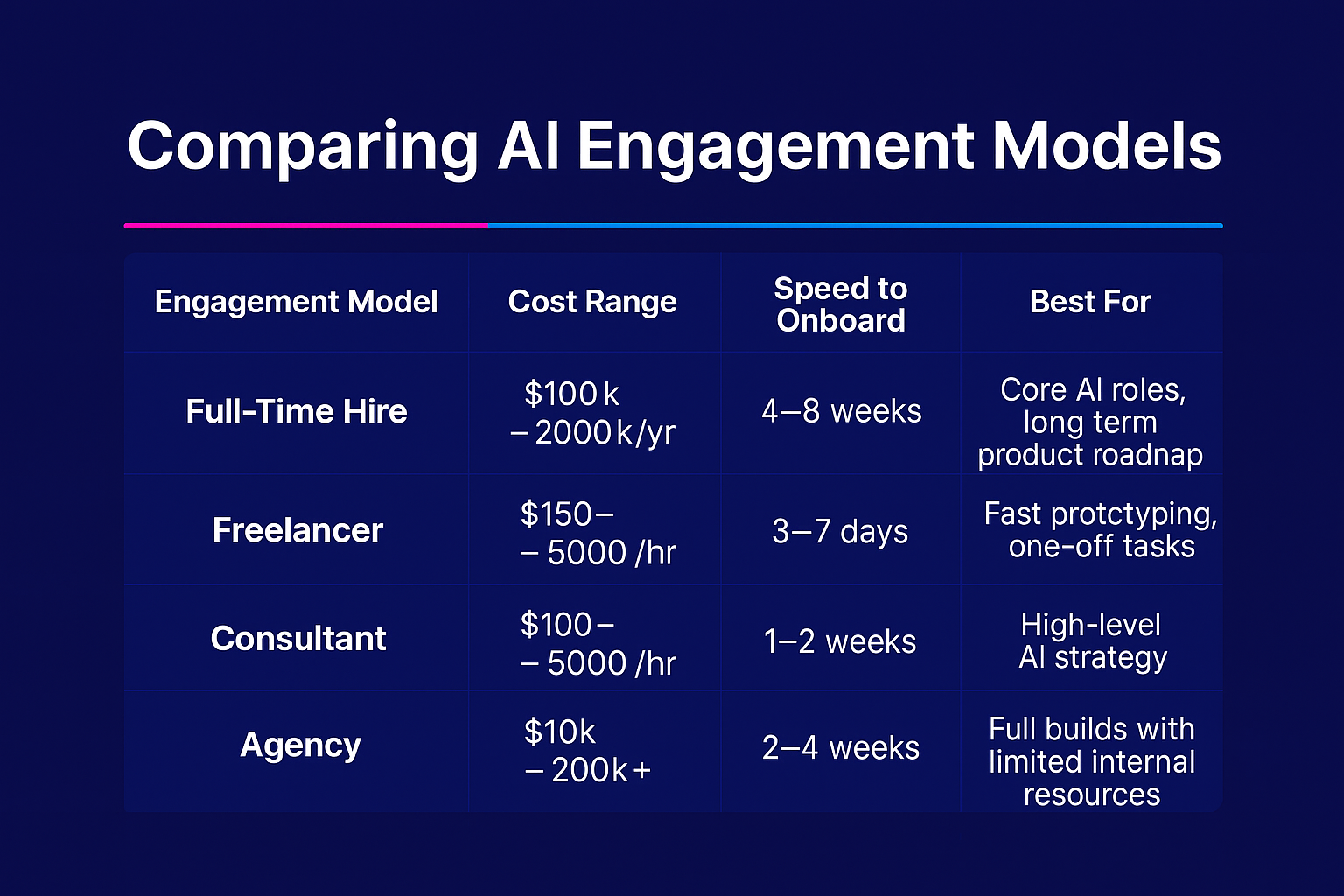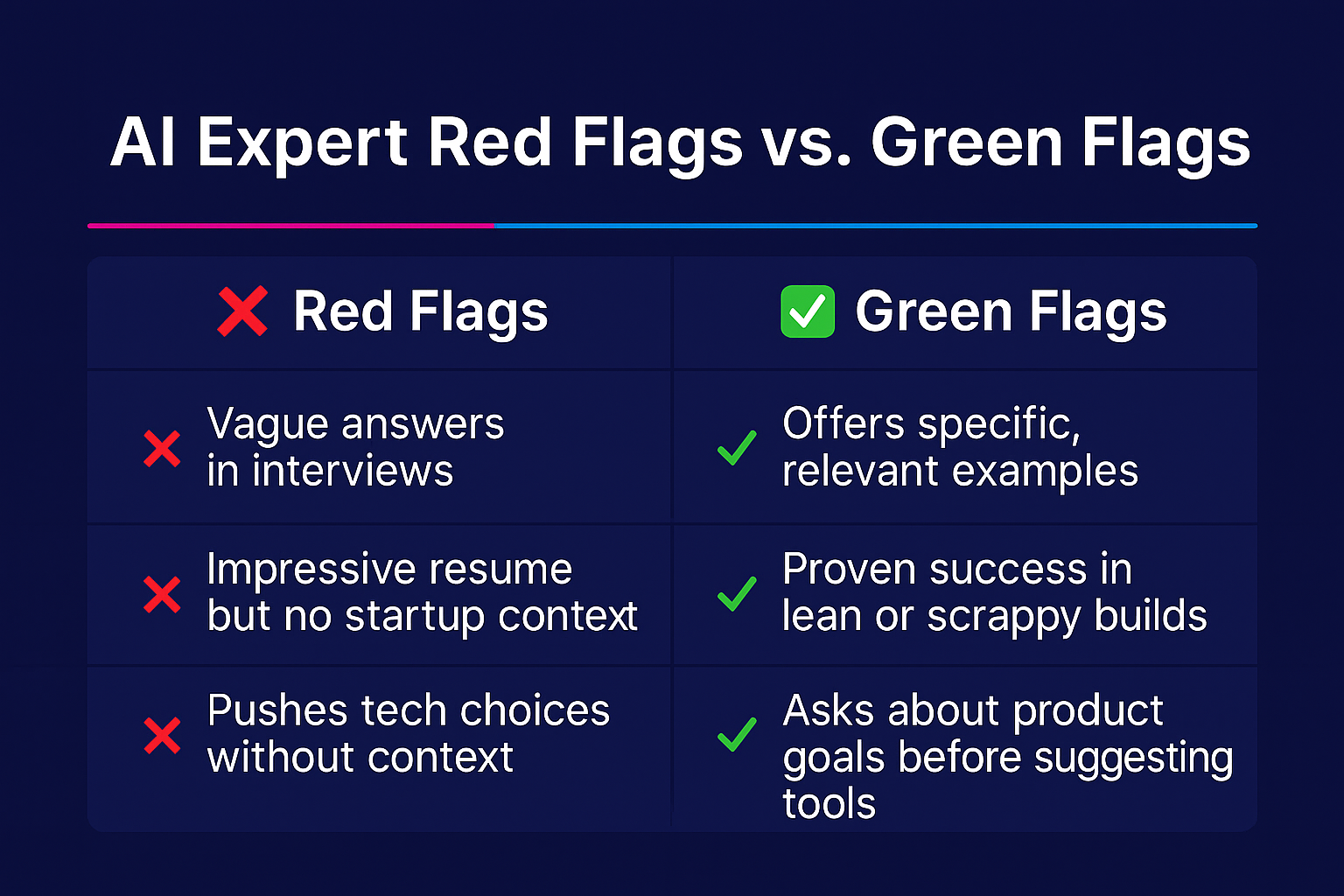Finding the right AI expert for your startup is no longer about chasing cutting-edge skills. It’s about avoiding the wrong hire or partner at the wrong moment.
In the last few years, AI has moved from experimentation to execution. Many founders now feel pressure to “bring in AI expertise” early; often before they’ve clearly defined the problem they’re trying to solve. That’s where things start to break down.
The reality is that most early AI initiatives don’t fail because the technology is too complex. They fail because the expertise brought in doesn’t match the stage, constraints, and real needs of the business.
This guide is meant to help you think clearly about what “the right AI expert” actually means for a startup, when you need one, what to look for, and how to avoid common (and expensive) mistakes.
Contents
Step 1: Clearly Define Your AI Needs
Before you start browsing profiles or posting job descriptions, clarity is key. You need to break down exactly what your AI requirements are:
Identify the Specific Problem AI Will Solve
Consider your core business challenges. Are you trying to automate manual processes, enhance user experiences with personalised recommendations, or generate actionable insights from customer data?
You must distinctly identify your goals to focus your search.
Determine the Right AI Specialist Role
Different AI roles have distinct responsibilities and skillsets:
- Machine Learning Engineers build and deploy predictive models.
- Data Scientists analyse complex datasets to drive strategic decisions.
- AI Developers integrate AI technology directly into products.
- Strategic AI Consultants advise on the AI strategy rather than execute technical tasks.
Choose the role based on your startup’s current needs and future vision.
Understand the Engagement Level Required
Consider whether you need continuous involvement, short-term project assistance, or strategic advice. For instance, initial prototype development could likely be performed by a freelancer, while continuous product improvements might necessitate a full-time hire.

Looking to Integrate AI into Your Business?
Get straight to the point, jargon-free advice on transforming your tech strategy by leveraging AI from an expert that has been building award-winning Startups for the past 10 years.
Step 2: Selecting the Best Engagement Model
Your hiring strategy should align with your startup’s budget and stage. Clearly understanding your engagement model upfront streamlines the subsequent search and evaluation process.
Please note, in this section, any mention of salary ranges is based on data in the USA at the time of writing and may differ depending on your operating location.
Full-Time AI Expert
If your project demands ongoing innovation and close integration with your team, a full-time AI expert is ideal. Salaries for these roles typically range from $100,000 to $200,000 annually, with the average total compensation reaching around $210,000 when bonuses and stock are included.
Hiring timelines can vary. Most startups can expect the recruitment and hiring process to take 30 to 60 days, followed by an additional 4 to 8 weeks of onboarding, including orientation, tooling, and ramp-up time.
Because full-time hires are a long-term investment, this route is best suited to startups where AI is central to the product roadmap. That said, if you’re trying to move quickly, you may want to avoid this option, especially as the wrong decision here can be fatal to the future of your startup.
AI Consultants
AI consultants provide strategic insights and high-level guidance, crucial if your startup is developing a comprehensive AI strategy or making critical technological decisions. According to ZipRecruiter, as of May 2025, the average hourly pay for an AI Consultant is $54.60, with rates typically ranging between $46.15 and $63.22 per hour.
Consultants usually require 1 to 2 weeks of onboarding to fully understand your business and goals.
Freelance AI Experts
Freelancers offer flexibility and cost-effectiveness, perfect for initial phases like prototyping or specific project tasks with clearly defined scopes and timelines. Rates typically range from $150 to $300 per hour, depending on expertise and demand.
Freelancers can typically be onboarded within a few days to a week, depending on the project’s complexity.
AI Agencies
AI agencies manage comprehensive AI implementations, handling strategic, technical, and operational aspects. Typical project costs range from $10,000 to $50,000, depending on scope and deliverables.
Agencies usually require 2 to 4 weeks to get fully onboarded and aligned with your project’s goals and expectations.
For a clearer picture of what your AI project might cost, feel free to explore this pricing calculator. Or if you’d prefer, get in touch directly and we’ll provide a tailored estimate based on your goals and scope – no strings attached.

Step 3: Where to Find Your AI Talent
After selecting your engagement model, here’s how you can effectively locate qualified AI experts:
Freelance and Remote Talent Platforms
Platforms like Upwork and Toptal provide quick access to skilled AI freelancers. For specialised or high-calibre talent, marketplaces like Andela or Gigster can also be good options.
Professional Networks and Communities
Platforms such as LinkedIn and GitHub allow you to assess professionals through their past projects and contributions. Networking at industry events such as Web Summit or AI Expo also yields valuable personal connections.
AI Agency Platforms
Specialised platforms such as Clutch, GoodFirms, or G2 provide extensive reviews, ratings, and detailed agency profiles, helping you quickly identify reputable AI agencies that match your needs.
Step 4: Evaluating AI Experts by Engagement Model
Evaluating a Full-Time Hire
When evaluating a full-time hire, your primary goal should be to identify someone who can grow with your startup and contribute meaningfully over the long term.
Conduct thorough practical assessments tailored specifically to your unique business challenges. For example, if you’re building an AI-driven customer recommendation engine, ask candidates to present their ideas or previous relevant experiences in similar projects.
Additionally, carefully review their portfolios, examining past project outcomes to assess both innovation and practical results. Remember, technical brilliance alone isn’t enough; a strong cultural fit and excellent communication skills are crucial for seamless integration with your existing team.
Evaluating an AI Agency
When assessing AI agencies, it’s not just about their track record or technical chops—it’s about how well they align with your product vision and your way of working.
Start by requesting detailed case studies and examples of work that mirrors your own project’s scope and complexity. Even better, ask to speak directly with past clients. Any agency that values transparency will welcome that request, it’s a major green flag.
But don’t stop at credentials. Pay close attention to the people. Do they feel like partners, or just vendors? When you talk about your startup and how you plan to leverage AI, do they challenge your assumptions, ask insightful questions, and sound genuinely invested in your product’s success?
That’s the level of engagement you want. Because even though you’re not hiring them as employees, the best agency relationships often feel like they’re part of your internal team.
Finally, review their delivery process. Are timelines, tools, and check-ins clearly defined? Do they offer visibility into how decisions are made and communicated? Strong technical execution means nothing without strong collaboration.
Evaluating a Freelance AI Expert
Evaluating freelancers requires careful attention to their flexibility, reliability, and specific technical expertise relevant to your project needs.
Closely review their portfolio, looking specifically for past work that aligns with your project’s scope.
Pay special attention to client feedback to gauge their reliability and quality of delivery. In your initial interactions, assess their responsiveness, clarity in communication, and overall reliability; these qualities are critical, especially when working remotely or asynchronously.
Clearly discuss their availability and confirm they can confidently meet your project timelines and any specific technical requirements.
Bonus Tip: Run a Low-Risk Test Before You Commit
Once you’ve narrowed down your options, don’t rush straight into onboarding, no matter how strong a candidate looks on paper.
Regardless of the engagement model you choose for hiring an AI expert, consider running a small, paid test project before you formally bring them on board. This gives you a real-world look at how they think, communicate, and deliver without jumping into a full engagement too soon.
The test doesn’t need to be complex. It could be a prototype slice, a short discovery sprint, or an AI audit of your current approach. The goal isn’t perfection. Rather, it’s insight into how they collaborate, handle feedback, and operate under pressure.
Even a few days of hands-on work will tell you more than any interview or case study ever could.

Step 5: Successfully Onboarding Your AI Expert
Even the most skilled AI expert won’t move the needle if they’re not integrated properly. A successful onboarding process turns new hires or partners into productive collaborators from day one.
That means treating onboarding not as a one-off checklist, but as a structured and ongoing process that aligns your new expert with your product goals, team culture, and execution cadence.
Define Success in the First 30 Days
Start by mapping out what success looks like in the first month.
If you’re hiring a freelancer to develop an ML-powered prototype, success might mean delivering a working model, documenting assumptions, and surfacing limitations.
For a full-time hire or agency, it might include aligning with your team on business goals, reviewing your technical infrastructure, and planning the next sprint together.
Prioritise Knowledge Transfer
AI projects are highly context-dependent. Your new expert needs to understand your domain, your users, and your data.
Share your product vision, user research, datasets, and any previous models or technical architecture. If you’re bringing in an agency, ensure they run a full kickoff session that involves both business and tech stakeholders to lay the right foundation.
Eliminate Friction with the Right Tools and Access
One of the easiest ways to lose momentum is by delaying access. Make sure your expert has what they need on day one: GitHub repos, staging environments, analytics dashboards, and collaboration tools. A smooth setup removes friction and builds trust from the start.
Set Communication Norms Early
Will you run weekly standups? Async updates? Who owns what decisions? Establish communication norms and feedback loops up front.
For freelancers, that might mean weekly updates via Loom or Notion. For agencies, you might structure formal sprint reviews at regular intervals.
Be Proactive, Not Reactive
The best onboarding is designed in advance, not improvised. It anticipates the support and structure your AI expert will need to thrive.
Build in regular check-ins, and treat onboarding like a product milestone: planned, executed, and refined.
Sign up for our newsletter
Join hundreds of entrepreneurs and business leaders to receive
fresh, actionable tech and startup related insights and tips
Common Pitfalls to Avoid
Hiring AI talent is hard enough, so don’t sabotage the process by falling into these avoidable traps. Whether you’re working with a freelancer, agency, or full-time hire, these mistakes can derail your build before it even begins.
Chasing Credentials Over Capability
Just because someone worked at a big tech company or has a PhD doesn’t mean they’re the right fit for a startup environment.
AI expertise doesn’t automatically translate to product intuition or lean execution. Look for candidates who have delivered in similar early-stage contexts. People who can operate with ambiguity, prioritise ruthlessly, and solve problems in scrappy, creative ways. And above all, make sure they’re aligned with your vision and willing to challenge your thinking when it matters.
Vague Objectives
If you’re unclear about what success looks like, don’t expect your hire to figure it out for you. Sure, they can be part of the conversation, but the buck stops with you.
Misalignment on goals is one of the fastest ways to burn time and budget. Define the outcomes you need clearly, whether it’s a working prototype, a proof of concept to raise investment, or a production-ready model. Without that clarity, even great talent can go off course.
Neglecting Culture Fit
Don’t underestimate how important it is that your AI partner understands your startup. Remember, this isn’t just about full-time hires, this applies equally to freelancers, consultants, and agencies.
Regardless of the engagement model, you’ll be trusting them to make decisions, manage their own time, and contribute meaningfully to your product. That only works if they align with your values and working style.
Do they communicate clearly? Do they understand the pace and uncertainty of startup life? Can they make autonomous decisions that reflect your priorities? A brilliant hire who clashes with your way of working will slow you down, not speed you up.
Rushing the Hiring Process
As an early-stage startup, time is tight. The pressure to move quickly is immense, but a bad hire is worse than no hire at all. The wrong person can drain your runway, stall development, and create technical debt that’s hard to recover from. It’s one of the fastest ways to lose momentum in the early stages.
Take the time to validate their claims. Ask to see past work. Speak to references, ideally people who’ve worked with them in similar startup environments. And even if you’re confident, consider running a small paid test project. It’s one of the most effective ways to assess both skill and working style before making a bigger commitment.
If you’re under pressure to move quickly, consider engaging a freelancer or agency first. It gives you the speed and flexibility you need without locking into a long-term commitment too early.
You can always scale up later, but cleaning up a rushed decision is much harder.
Trust your gut. If something feels off, it probably is.
Building Your AI-Driven Future
Finding and onboarding the right AI expert is the result of a deliberate, structured process that starts with understanding your product vision and ends with a fully aligned contributor driving it forward.
If you’ve made it this far, you should have everything you need to succeed—from defining your AI needs, to choosing the right engagement model based on your budget and runway, to knowing where to find talent and how to evaluate and onboard them for your unique context.
The takeaway? You don’t need to be an AI expert to bring real AI value into your product. But you do need to stay in the driver’s seat.
Don’t lose sight of your role: the architect of your startup’s mission.
To succeed, you need clarity, structure, and a realistic strategy to match the right expertise with your stage, goals, and constraints.
One final piece of advice: don’t be afraid to ask for help. Whether you’re validating a use case, comparing partners, or unsure how to vet technical candidates, find someone who’s done it before. It’ll save you months of guesswork and reduce your time-to-value dramatically.
Thanks for reading.
FAQ: Finding an AI Expert for Your Startup
How much does it cost to hire an AI expert?
Rates vary depending on the engagement model. Freelancers often charge between $150 and $300 per hour. Agencies typically start from $10,000 per project. Full-time hires can cost between $100,000 and $200,000 per year, not including bonuses or equity.
Do I need to be technical to hire AI talent?
No, but you do need to be clear. Define your goals, success metrics, and timeline. If you’re not technical, bring in someone who can help evaluate candidates or run a short paid test project first.
Should I hire a freelancer, agency, or full-time engineer?
It depends on your stage, budget, and runway. Freelancers offer speed and flexibility. Agencies bring a full team and project structure. Full-time hires are best when AI is a central part of your long-term product roadmap.
Where’s the best place to find AI experts?
Try platforms like Toptal or Upwork for freelancers, LinkedIn and GitHub for individuals, and Clutch or GoodFirms for agency reviews. For high-trust referrals, tap into your founder network.
What’s the biggest mistake founders make when hiring AI talent?
Rushing. Hiring the wrong person, especially without clear objectives or cultural alignment, can cost you months of progress and budget. Validate with real work before committing.

